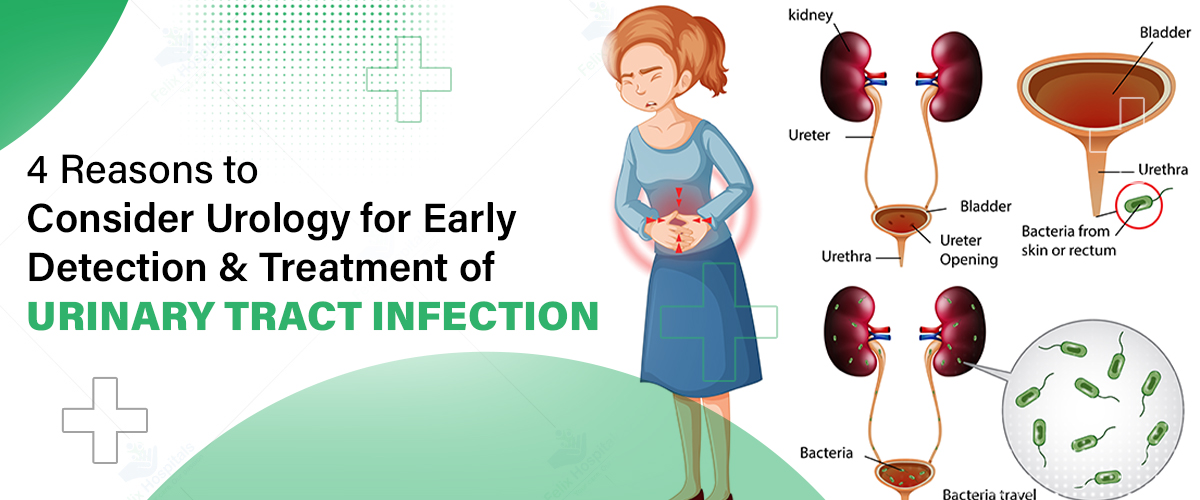
Subscribe to our

Urinary tract infections (UTIs) are among the most common infections affecting millions of people each year. They can cause significant discomfort, pain, and serious complications if left untreated. While many individuals may try to manage UTIs at home, consulting a urologist for early detection and treatment is essential for effective care. At the best urinary tract treatment hospital in Noida, expert urologists can provide the specialized attention needed to address these infections. Let’s explore four compelling reasons why urology should be your go-to specialty for managing UTIs.
Don't Wait for Discomfort! Early detection and treatment can help you regain your comfort and health. Schedule your appointment by Clicking Here!
Urologists are specialists in the urinary tract system, which includes the kidneys, ureters, bladder, and urethra. Their extensive training allows them to diagnose and treat various urinary issues, including UTIs. Unlike general practitioners, who may have a broader focus, urologists possess specialized knowledge that equips them to recognize complex conditions and underlying causes of recurrent infections.
After diagnosing a UTI, urologists can create tailored treatment plans that suit your specific needs. They consider various factors such as the type of bacteria causing the infection, your overall health, and any previous medical history. This personalized approach can lead to more effective treatment and quicker recovery.
One of the critical roles of a urologist is to provide ongoing care and prevention strategies for UTIs. They focus on not just treating the current infection but also preventing future occurrences. This proactive approach can significantly improve your quality of life and reduce the risk of complications.
Sometimes, recurrent UTIs may be a sign of underlying health issues that require attention. Urologists are trained to identify these conditions and provide appropriate interventions. By seeking urological care, you can address potential problems that may lead to chronic infections.
At Felix Hospital, you’ll find the best doctor for urinary tract infection treatment. Our experienced urologists Dr. Bhanwar Lal Barkesia are dedicated to providing personalized care tailored to your needs, ensuring the best possible outcomes for your urinary health.
Take Charge of Your Health! Are you struggling with recurrent UTIs? Call us to learn more at +91 9667064100.
Urinary tract infections can significantly impact your daily life, and addressing them promptly is essential. While home remedies may provide temporary relief, consulting a urologist for early detection and treatment can lead to better outcomes. Their specialized knowledge, effective treatment plans, focus on prevention, and ability to identify underlying conditions make them invaluable in managing UTIs.
If you suspect you have a UTI or experience recurrent infections, don’t hesitate to seek urological care. Early intervention can prevent complications, improve your quality of life, and set you on the path to better urinary health and understanding the treatment cost of urinary tract infections can help you plan for necessary care without financial stress.
1- What are the common symptoms of a urinary tract infection?
ANS: Common symptoms of a UTI include a frequent urge to urinate, a burning sensation during urination, cloudy or strong-smelling urine, pelvic pain, and sometimes fever or chills.
2-How is a urinary tract infection diagnosed?
ANS: UTIs are typically diagnosed through a urine sample, which is tested for bacteria, white blood cells, and other indicators of infection. In some cases, imaging tests or cystoscopy may be recommended.
3-What are the main causes of urinary tract infections?
ANS: UTIs are usually caused by bacteria entering the urinary tract, commonly from the rectal area. Factors such as sexual activity, certain types of birth control, menopause, and urinary retention can increase the risk.
4-Can I treat a UTI at home?
ANS: While some mild UTIs may improve with home remedies, it's essential to consult a healthcare professional for proper diagnosis and treatment to prevent complications.
5-What is the typical treatment for a urinary tract infection?
ANS: UTIs are commonly treated with antibiotics. The specific antibiotic prescribed will depend on the type of bacteria causing the infection and its sensitivity to the medication.
6-How can I prevent recurrent urinary tract infections?
ANS: Preventive measures include drinking plenty of water, urinating before and after sexual intercourse, wiping front to back after using the toilet, and avoiding irritants like caffeine and alcohol.
7-When should I see a urologist for a urinary tract infection?
ANS: You should consult a urologist if you experience recurrent UTIs, if symptoms worsen or persist despite treatment, or if you have underlying health conditions that may complicate your infection.